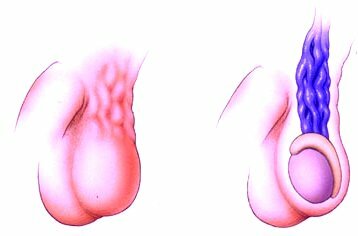When and how to take tests for sexual infections in men?
Infections affecting the external and internal genital organs in men are divided according to their origin or etiological sign:
- Viral;
- Bacterial( including intracellular bacteria);
- Fungal;
- Protozoal.
It is from the etiologic factor that most diagnostic procedures are determined, aimed at detecting sexually transmitted infection( STI).
Contents
- 1 When should I take tests for STIs?
- 2 Prepare for testing for genital infections
- 3 Procedure for testing for STDs
- 3.1 Study material
- 3.2 Methods of testing
- 4 When is it necessary to re-take tests?
- 5 Who decodes the tests for genital infections?
When should I take tests for STIs?
If the following symptoms occur:
- Unpleasant sensations, pain in the inguinal region and external genitalia;
- Discharge from the urethral canal( colorless or whitish, with a pungent odor or without);
- Itching and burning in the groin and along the urethra;
- Discomfort during sexual intercourse or ejaculation.
In the following situations:
- With unprotected intercourse;
- When you have sex with people who have sexually transmitted diseases( STDs);
- During the planning of the child, before the onset of pregnancy, the partner;
- Before the wedding;
- Repeatedly, after treatment of STDs, to monitor the effectiveness of therapy;
- With an active sexual life.
Active sex life implies two-time delivery of tests for STIs during the year, regardless of the number of partners, the type of sex and the use of contraception.
Preparation for the passing of tests for sexual infections
To increase the reliability of diagnostic procedures, preparation for the delivery of tests is necessary:
- The analysis is performed on an empty stomach. The interval between eating and taking tests is at least 7 hours.
- When carrying out a serological reaction aimed at detecting the causative agent of syphilis, in no case can fatigue be eaten on the eve. Otherwise, the risk of a false positive result is significantly increased.
- Before taking swabs from the urogenital tract, you need to refrain from urinating for 4 hours. When urinating, a significant part of the infection is washed out, which reduces the accuracy of the analysis.
- Before taking the tests, you should not use external agents for rashes, flaking, or other visual manifestations of genital diseases. For analysis, it may be necessary to scrape the biological material from the affected area.
- To increase the efficiency of detection of intracellular parasites, a provocation procedure can be carried out. Provocation consists in a short-term reduction in the patient's immunity, in order to activate the pathogenic infection. This increases the chance of identifying the pathogen.
Procedure for the delivery of analyzes for STDs
Material for the investigation of
To identify pathogens, the following biological fluids are taken:
- Blood;
- Sperm;
- Urine;
- Discharge from urogenital tract.
The blood test helps to identify the intensity of immunity, the increase in the number of leukocytes - leukocytosis with a shift of the leukocyte formula to the left, which is typical for bacterial infection. Also, blood is used to formulate serological reactions, the purpose of which is to identify either antibodies specific to the pathogen or the antigens of the pathogen itself.
Spermogram analysis confirms or excludes damage to the reproductive system of the male body, and also shows the activity of spermatozoa.
Urinalysis can provide data on the location of the infection, the pathogen and the degree of damage to the urinary system. In the general analysis of urine determine its density, the presence of erythrocytes, leukocytes, cylinders, the epithelium of the urethra. If there is an active infectious process in the urine, mucus is also detected.
Taking a smear from the urethral can directly detect microscopy of an infectious agent that is sexually transmitted. If difficulties arise, the pathogen is planted on the nutrient medium, which confirms the diagnosis.
Methods of research
The most accurate method of diagnosis of STI is PCR and ELISA diagnostics.
Polymerase chain reaction( PCR) is the most advanced and advanced method. It allows to determine with high accuracy any pathogen of STDs, including viral etiology.
ELISA is an enzyme immunoassay. The method is much cheaper than PCR and also allows you to identify any infection of bacterial etiology, but not viral.
Further on the effectiveness of detecting infection is taking a smear and planting on the nutrient media of the pathogen. It also helps to confirm a clinical diagnosis. The rest of the tests help to supplement the above.
When is it necessary to re-test?
Re-delivery of tests is necessary and performed in the following cases:
- To exclude false-positive or false-negative results of the study;
- For monitoring after treatment of STDs.
In both cases, reanalysis is a prerequisite for the precise exclusion of the disease. The control delivery of the tests also shows the effectiveness of the treatment and identifies the criteria for the complete recovery of the patient.
Who decrypts tests for sexual infections?
- The doctor of laboratory diagnostics;
- Urologist;
- The dermatovenerologist.
Analyzes are prescribed by a urologist or dermatovenereologist, but their conduct and evaluation is handled by a laboratory diagnosis doctor. The urologist and dermatovenerologist can also decipher the results of the analysis.
See the video about testing for STIs in men:
Recommended for viewing:


